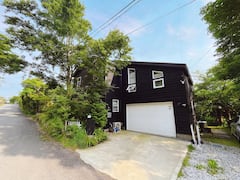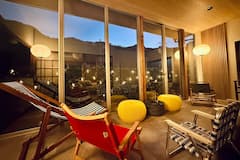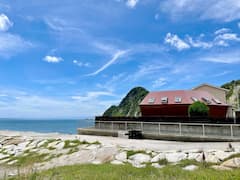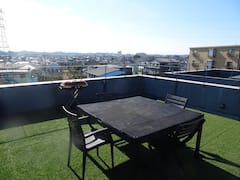Are you interested in taking a trip to an onsen on your next trip to Japan but are intimidated by all of the unspoken customs? Onsen, or hot springs, are one of the trademarks of Japan and highly recommended for anyone travelling to Japan. This article will debunk 21 of the most common myths around onsen so that you can take a dip with composure and confidence!
At your searching phase of an onsen ryokan...
1. What is a ryokan? How is it different from an onsen?

Before delving into the world of onsen, it is necessary to define ryokan as well, as the two terms are similar and often confusing to foreigners.
Ryokan are traditional Japanese-style inns, and usually features public or private baths as its signature facility. Additionally, ryokans provide excellent room-service hospitality, such as coordinating in-room dinner or breakfast, as well as futon bedding services.
Meanwhile, onsen is a hot spring, also known as a public bath among Japanese where one goes to relax. As stated above, onsen are often included as part of ryokans’ bathing facilities. In this sense, onsen and ryokan are two terms that go hand in hand with each other.
2. How can I find a ryokan with an onsen?

Onsen literally means hot spring, and are usually found near or between mountainous areas. You usually won’t be able to find a natural onsen in the city or in a flat area. You can also look to see if a ryokan’s signature facility is an onsen when checking out their website.
You might be interested in these Airbnbs!
3. Why does the price vary?
Ryokan with onsen facilities usually cost more than a regular inn or hotel. This process is similar to the Western idea of “star” rankings. The higher the reputation of the ryokan, the more it will cost. This reputation could come from having a long history, the standard of service, the quality of food and so on. However, you don’t necessarily need to spend a bomb to enjoy ryokan and onsen, as there are many different offerings for any budget.
4. What is the proper price for an onsen ryokan?
As mentioned above, it depends on the quality of the onsen/ryokan.
5. How can you know if the onsen/ryokan is genuine?

Although it is common now for tourists to be lured by any old ryokan, one of our house recommendations is that the simple is the best. As many ryokans gain respectability through excellent service and a long history, the nicest looking web page doesn’t necessarily ensure the best ryokan. When doing your research on ryokan and onsen, be sure to check other reviews of the ryokan and not to be swayed simply by the design of the homepage.
6. What websites are recommended for booking an authentic ryokan?
If this is your first time staying at a ryokan, we recommend not to rely solely on international hotel booking sites unless you have gotten a direct recommendation for the ryokan. One site that is particularly useful for finding a genuine ryokan is: JAPANiCAN.com, a website that is organized by the JTB, a Japanese travel company.
7. Are there any cheaper, onsen-only options available when we book a ryokan?

Yes! If you just want to experience the onsen without the price of staying at a ryokan, there are many ryokans that offer “higaeri” or one-day experiences. Also, there are lots of public onsen spots. Read more in “Enjoy Hakone’s Superb Hot Springs Even You Are On A Budget”
When you get to an onsen ryokan...
8. What is the polite thing to do when first entering a ryokan?

Similarly to any hotel, when you first arrive at a ryokan, the only thing that is necessary is to check in! Service is the speciality of ryokan, so you will usually be ushered in with a greeting and a smile. Workers at the ryokan will usually lead you to your room and give you an explanation of the facilities. If you are staying in a tatami room, be careful not to drag your luggage around the room, as the tatami is very delicate and can be easily damaged. Learn more about the ryokan etiquette in“How To Enjoy A night Stay In Onsen Ryokan Stay The Japan Way”
9. If ryokans are traditional, does that mean the toilets are traditional too?
Japanese traditional-style toilets refer to squat toilets, that were common in Japan many years ago. Although there may be some ryokan that may still have squat toilets, most ryokan, especially higher-ranking ryokan, have renovated their toilets to Western-style toilets.
10. When can we go to the onsen after check-in?
Usually after you are led to your room and receive the procedure explanation from the staff, you are free to go to the onsen at anytime! Be sure to grab your yukata from your room and check which onsen are available at the time, as some may be inaccessible due to cleaning.
11. Do men and women use different onsen?
Most public bathing facilities offered at ryokan are separated by gender. It is best to ask at the front desk during check-in what onsen is open to what gender. Some ryokan offer different style onsen, and the usage time is divided between male and females (for example, men will be able to use the bath from 3pm to 6pm and women will be able to use it from 6.30pm to 10pm, for example). Be sure to have a good grasp of the day’s schedule so you don’t miss out on a certain type of bath!
12. When at the onsen... is it necessary to strip naked?

Yes! This is the number one custom of all onsen. The only towel that you are allowed to bring into the actual bath area is a small face towel. Although you can cover up using this towel when entering and exiting the bathing area, be sure to not put your towel into the actual onsen itself! When inside the onsen, it is typical to keep this towel wrapped around your hair so that it does not enter the onsen. And please don’t forget to dry your feet on the bath mat when you get back into changing area.
13. Are tattoos really taboo?

Tattoos, called irezumi in Japanese, are typically considered taboo in Japan, and will usually restrict you from being able to enter any onsen. However, there are some ryokan that will allow you to go into the onsen if you cover up your tattoo, or if you reserve a private bath. Be sure to inquire before you make your reservation.
14. Can you drink alcohol while in the onsen?
Certain ryokan will have sake available near the onsen area, but we don’t recommend bringing in your own! Your best bet will be to ask the reception upon arriving if there is sake available. Even if you are not allowed to drink sake in the actual bath, most ryokan will have options where you can drink sake or milk as soon as you get out of the onsen.
15. Is it a no-no to dump towels into onsen bath!?

When you are soaking in a public bath, it is not allowed to dip your towel into the bath due to hygiene reasons. You need to put the towel on top of your head. Thus, you will see everyone in the onsen bath put their towels on the head. Also, you need to tie up your hair to not let it touch the bath too. It’s strange to do these things as we are in the bath together. But this is the Japanese tradition.
Everything else to ask about an onsen ryokan!
16. What is a yukata?
A yukata is a simpler, summer version of the kimono. Most ryokan will have yukata for you to wear when going to the baths. If you need assistance putting on your yukata, refer to the video above or ask the front desk. Since the yukata is mainly for use within the onsen, there is no need to over-complicate the process. Just put on your yukata and tie the obi loosely around your waist. For females, the tie should fall around your stomach. For males, the tie will be a little lower, around your waist.
17. What types of onsen are there?

Depending on the ryokan that you stay at, you will be able to experience the different types of onsen water! As onsen water is believed to have healing powers, there are different types of minerals for healing certain types of pain. There are 11 different categorisations of hot springs, with the most common being sulphur hot springs. You can find different types of onsen from this article“Quirky Onsen Experience In Japan”.
18. Are there private baths at ryokan? How do I reserve them?

If you are a feeling a little shy, some ryokan offer private bathing rooms, or even private baths at each room! Although these baths come at an extra price, you are able to have an onsen experience among your own party. Some private baths require prior reservations, but some are offered on a first come first served basis. Usually, these private rooms are quite popular, and there could be a line!
For more information about en-suite onsen options, please refer to the following articles:
Top 8 Exclusive En-suite Onsen Experiences Accessible From Kyoto
Top 10 Luxury En-suite Onsen Ryokans To Stay Within 3 Hours From Tokyo
19. What meal options are available at ryokan?

One of the best things about staying at a ryokan is to enjoy dining after the onsen. There are two main dining options: being served in the main dining hall or a more cosy option of eating in your room. When eating in your room, the ryokan workers will set up the entire meal for you while you are in the onsen.
20. What if I have food allergies?

If the ryokan you are staying at offers a buffet style meal, you can usually inquire about what is inside each dish. If your dinner is served at your room, inform the staff of your allergies when making the reservation, although there is no guarantee every ryokan will be able to make accommodations.
21. Is it necessary to tip the nakai-san (maid)?
Just like anywhere else in Japan, it is not necessary to leave a tip for the maid or any of the service staff. Excellent service is the sales point for most ryokan, and they live up to their job.
However, if you request something extreme, like getting a room upgrade for the same price, or break anything, it is necessary to pay some money, not necessarily as a tip, but as a fee.
Onsen myths debunked
Although somewhat intimidating at first, following the aforementioned advice will help make your stay at an onsen/ryokan as smooth as possible. By following these tips, you will become an onsen master!
History
Get Trip101 in your inbox
Unsubscribe in one click. See our Privacy Policy for more information on how we use your data























Create an account to